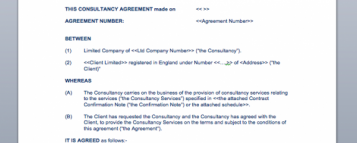A confirmation of arrangements letter from your client can be used to back-up your IR35 position with HMRC should it be challenged, as it confirms how you perform your contract duties in reality.
IR35 Rules
The Intermediaries Legislation was introduced in 2000 to tackle 'disguised employment', where an individual uses a limited company to carry out professional services, but works in a manner more like an 'employee'. Your take home pay will be significantly lower if your contracts fall within its scope.
Off-Payroll Rules
The 'off-payroll' addition to the existing IR35 rules was introduced across the public sector in April 2017 and the private sector in April 2021.
The 'Off Payroll' rules mean that clients (not contractors) are responsible for determining the employment status of contractors. Before this, workers themselves were responsible for this determination.
Get started with these IR35 guides
- Start with our overview of IR35 for a concise guide to the legislation.
- Read our Off-Payroll working FAQs for contractors.
- Try our IR35 tax calculator to find out the financial cost if you are caught.
- Download an IR35 contract template from Qdos
- Why you should consider taking out IR35 insurance.
The importance of professional IR35 contract reviews
For a relatively small outlay, a professional contract review service will analyse your contracts to ensure that you comply with IR35 – both in terms of your contract wording, but also the ‘working practices’ you undertake at your client site.
Free IR35 contract template downloads for contractors
To protect yourself against IR35, you need to be sure that the wording of your contracts (and the way you actually carry out your contract work for the client) show that you are genuinely ‘self employed’. Here we show where you can download a sample contract template.
IR35 status – what is the Mutuality of Obligation (MOO)?
One of the most important employment status factors is the mutuality of obligation. Here we explain what ‘MOO’ means in the context of the IR35 legislation.
Does the length of a contract influence IR35 status?
There is a common misconception that contract duration automatically has a bearing on IR35 status. Here, Martyn Valentine looks at why other factors are more likely to be significant than contract length in determining employment status.
IR35 – are you in business on your own account?
To ensure that any contracts you undertake are not deemed inside IR35, you need to be able to demonstrate that you are not a disguised employee, but truly working in the manner of a small business owner. In other words, can you show that you are ‘in business on your own account’?
What happens if you’re selected for an IR35 enquiry?
There is a huge amount of information available about IR35 and how to protect yourself. But what happens if you are selected for an investigation? How does an IR35 enquiry work now and what should you expect if HMRC contacts you regarding IR35 compliance?
The key factors which determine your IR35 status
The main factors used to establish whether or not an individual’s contract is caught by IR35 – the most important being Control, Substitution and Mutuality of Obligation. How to ensure that you’re not caught.
Working inside and outside IR35 – what are your options?
With more than six months since the private sector off-payroll (IR35) reforms were implemented, we look at the impact on contractors and how they can work both inside and outside IR35 compliantly via a dual solution.
Off-payroll (IR35) – what is a Status Determination Statement (SDS)?
Under the off-payroll rules, from April 2021, private sector clients are responsible for determining a contractor’s IR35 status. The decision must be contained within a Status Determination Statement (SDS), alongside the client’s reasoning.










